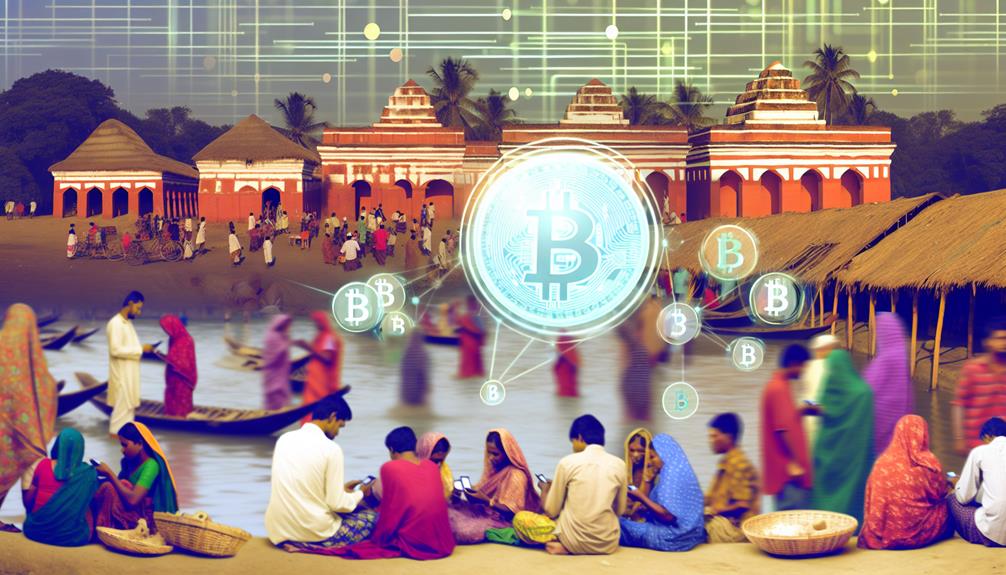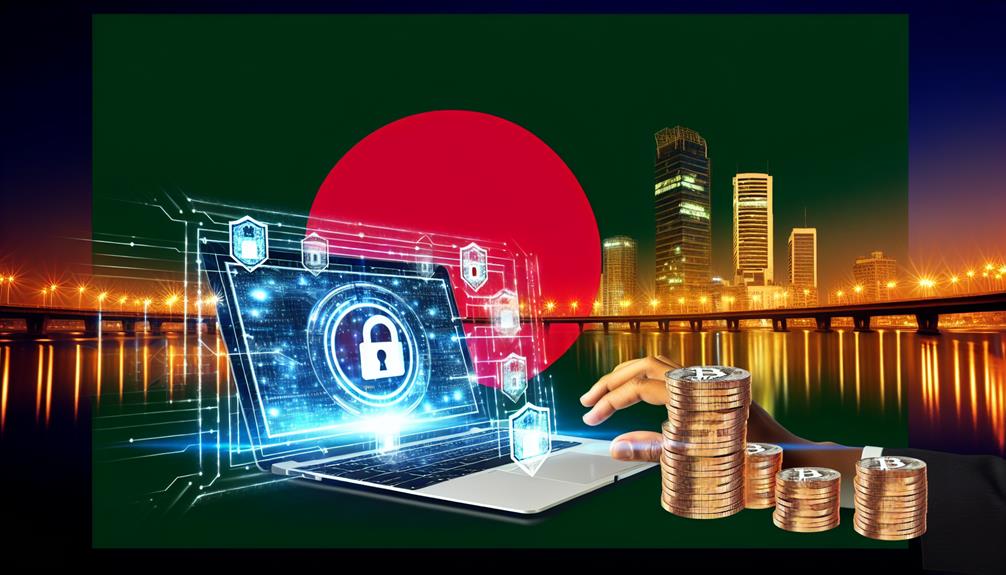In a world where digital currencies are gaining traction, the question of where to open a Bitcoin wallet account as a Bangladeshi citizen becomes increasingly relevant. You'll find a variety of options, from user-friendly apps to more complex exchange services, each with its own pros and cons. However, understanding local regulations and security measures is vital to guarantee your investment remains safe. What factors should you consider to make an informed choice, and which platforms might best align with your needs?
Understanding Bitcoin Wallets

When diving into the world of cryptocurrencies, understanding Bitcoin wallets is crucial for anyone looking to manage their digital assets effectively. A Bitcoin wallet is a software program that stores your private and public keys, enabling you to send and receive Bitcoin. There are several wallet types you should be aware of, each catering to different needs and preferences.
The primary wallet types include hardware wallets, software wallets, and paper wallets. Hardware wallets are physical devices that provide a high level of security, as they store your keys offline. Software wallets, on the other hand, come in desktop or mobile formats, offering convenience but varying degrees of security. Paper wallets involve printing your keys on a piece of paper, which can be secure but requires careful handling to avoid loss or damage.
When evaluating wallet features, consider factors like security, ease of use, and backup options. Security features like two-factor authentication and multi-signature support can greatly enhance your wallet's protection. User-friendly interfaces make it easier for beginners to navigate their wallets, while robust backup options guarantee you can recover your funds if you lose access.
Ultimately, choosing the right wallet type and features depends on how you plan to use Bitcoin. Whether you prioritize security, convenience, or a balance of both, understanding these aspects will empower you to make informed decisions about managing your digital assets in Bangladesh's evolving cryptocurrency landscape.
Popular Bitcoin Wallet Platforms
Choosing the right platform for your Bitcoin wallet is vital for effective management and security of your digital assets. With numerous options available, you'll want to explore various platforms to find one that suits your needs. Among the popular choices are mobile wallet options, which offer convenience for on-the-go transactions. Apps like Trust Wallet and Coinbase Wallet allow you to manage your Bitcoin directly from your smartphone, making it easy to send, receive, and store your assets securely.
When evaluating a platform, it's important to read exchange platform reviews. These reviews provide insights into user experiences, security features, and customer support. For instance, Binance and Kraken are well-known exchanges that also offer wallet services, but their features and fees can vary. By comparing reviews, you'll gain a clearer understanding of which platform aligns with your priorities—be it low transaction fees, security measures, or user-friendly interfaces.
Another factor to reflect on is whether you prefer a custodial or non-custodial wallet. Custodial wallets, like those offered by exchanges, control your private keys, while non-custodial options give you full control over your assets. Both have their pros and cons, so understanding your comfort level with security and management is key.
Ultimately, the best Bitcoin wallet platform for you will depend on your specific needs and preferences. Take the time to research and choose wisely to guarantee your Bitcoin journey starts on the right foot.
Local Regulations in Bangladesh

Maneuvering the landscape of Bitcoin in Bangladesh requires an understanding of the local regulations that govern cryptocurrency use. The Bangladeshi government has maintained a cautious stance towards cryptocurrencies, primarily due to concerns surrounding fraud and money laundering. As a citizen, it's important to be aware of the existing cryptocurrency regulations and guarantee legal compliance to avoid potential pitfalls.
Here are three key aspects you should consider:
- Legality: Cryptocurrencies aren't officially recognized as legal tender in Bangladesh. The central bank has issued warnings against trading and using Bitcoin, so it's significant to stay informed about any changes in this stance.
- Regulatory Bodies: The Bangladesh Bank oversees the financial sector, including cryptocurrency activities. Any transactions involving cryptocurrencies may fall under their scrutiny, and you should be prepared to comply with their guidelines.
- Risks and Penalties: Engaging in cryptocurrency trading without considering the legal framework can lead to severe consequences, including fines or imprisonment. It's important to fully understand the risks involved before diving into Bitcoin.
Staying updated on the evolving cryptocurrency regulations is important for your safety and compliance. As the landscape changes, always prioritize understanding the legal implications of your actions in the cryptocurrency space. This way, you can navigate the Bitcoin world in Bangladesh more confidently and responsibly.
Steps to Open a Wallet
Opening a Bitcoin wallet in Bangladesh might seem intimidating, but it can be a straightforward process if you follow the right steps. First, you need to choose the type of wallet that fits your needs. There are several wallet types available, including mobile wallets, desktop wallets, and hardware wallets. For beginners, mobile wallets are often the most convenient option as they allow easy access and management of your Bitcoin on the go.
Once you've decided on the wallet type, the next step is to select a reputable provider. If you opt for a mobile wallet, popular options include Trust Wallet, Coinomi, and Mycelium. Download the app from a trustworthy source, like the official website or app store, to guarantee security.
After installation, you'll need to create your wallet. Follow the in-app instructions, which typically involve setting a strong password and backing up your recovery phrase. This phrase is vital—if you lose access to your wallet, it's your only way to recover your funds.
Once your wallet is set up, you can fund it by purchasing Bitcoin from a local exchange or peer-to-peer platform. Make sure to verify the exchange's legitimacy and comply with local regulations when making your purchase.
Security Tips for Bitcoin Wallets

Securing your Bitcoin wallet is vital to protecting your investments from potential threats. With the rise in cybercrime, it's important to adopt robust wallet security measures. Here are three vital tips to guarantee your Bitcoin wallet remains safe:
- Use Strong Passwords: Create complex passwords that combine letters, numbers, and symbols. Avoid easily guessable information like birthdays or common phrases. It's often recommended to use a password manager to help you generate and store strong passwords securely.
- Enable Two-Factor Authentication (2FA): This adds an extra layer of security. Even if someone manages to get your password, they'll need a second form of verification, often a code sent to your mobile device, to access your wallet.
- Implement Backup Strategies: Regularly back up your wallet data and store it in multiple secure locations. If your device is lost or compromised, having a backup guarantees you can recover your funds. Consider using hardware wallets for added security, as they store your private keys offline.
Managing Your Bitcoin Investments
Investing in Bitcoin can be both exciting and challenging, especially for newcomers traversing the volatile market. To navigate this landscape effectively, you'll need to adopt sound investment strategies tailored to your risk tolerance and financial goals. Start by setting clear objectives—whether you're aiming for long-term growth or short-term gains. This clarity will guide your decisions and help you maintain composure during market fluctuations.
Wallet diversification is another key aspect of managing your Bitcoin investments. Don't put all your eggs in one basket; instead, spread your holdings across multiple wallets. This approach not only enhances security but also optimizes your access to different features and services. You might consider using a combination of hot wallets for day-to-day transactions and cold wallets for long-term storage. While hot wallets offer convenience, cold wallets provide robust security, minimizing the risk of theft.
Regularly reviewing your investment portfolio is essential. Keep an eye on market trends and adjust your strategies accordingly. It's wise to stay informed about technological advancements and regulatory changes that could impact Bitcoin's value. Additionally, consider using analytic tools that provide insights into market performance, allowing you to make data-driven decisions.
Lastly, be prepared for the emotional rollercoaster that comes with Bitcoin investing. Patience, discipline, and a clear strategy will serve you well as you manage your investments in this dynamic environment.
Frequently Asked Questions
Can I Open a Bitcoin Wallet Without a National ID in Bangladesh?
You can open a bitcoin wallet without a national ID by exploring various bitcoin wallet options that accept alternative identification methods. Research platforms that allow verification through documents like passports or utility bills for easier access.
What Are the Fees Associated With Opening a Bitcoin Wallet?
Did you know that nearly 40% of Bitcoin users face unexpected transaction costs? When opening a wallet, consider these fees alongside wallet maintenance, which can vary considerably depending on the service provider you choose.
Is It Legal to Use Bitcoin in Bangladesh?
In Bangladesh, while Bitcoin isn't officially recognized, it's not outright illegal. You should be aware of Bitcoin regulations and the associated cryptocurrency risks before engaging in any transactions, as the legal landscape may change.
Can I Access My Bitcoin Wallet From Multiple Devices?
You'll find that many wallets offer multi-device access, allowing you to synchronize your wallet across devices. Just confirm you've enabled the necessary settings for seamless synchronization and secure access to your Bitcoin anytime, anywhere.
How Can I Recover a Lost Bitcoin Wallet Password?
If you've lost your Bitcoin wallet password, use the wallet's password recovery options. Always guarantee your wallet security's robust, employing backups and two-factor authentication, to minimize risks of losing access in the future.
Conclusion
Opening a Bitcoin wallet as a Bangladeshi citizen can feel like charting uncharted waters. Just like a sailor relies on a sturdy boat to weather storms, you need a reliable wallet to safeguard your investments. By choosing the right platform, staying informed about local regulations, and prioritizing security, you're setting yourself up for smooth sailing in the cryptocurrency sea. Remember, your wallet is your lifebuoy—choose wisely and keep your assets afloat in this digital age.
